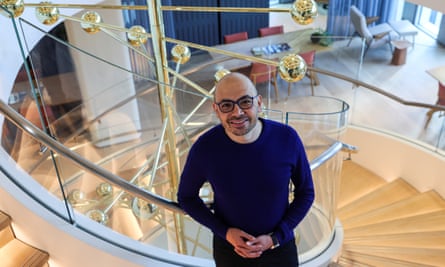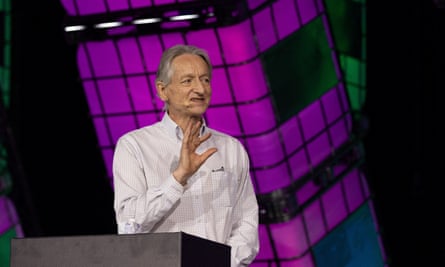‘They don’t neutral real plunge out of trees’: Nobel awards highlight Britain’s AI pedigree – Guardian

It used to be better than even primarily the most ardent advocates expected. No matter the entirety the demonstrations of superhuman prowess, and the debates over whether the technology used to be humanity’s most productive invention but or its surest path to self-destruction, synthetic intelligence landed a Nobel prize this week. After which it landed any other.
First got here the physics prize. The American John Hopfield and the British-Canadian Geoffrey Hinton won for foundational work on synthetic neural networks, the computational architecture that underpins trendy AI similar to ChatGPT. Then got here the chemistry prize, with half handed to Demis Hassabis and John Jumper at Google DeepMind. Their AlphaFold program solved a decades-prolonged scientific concern by predicting the structure of all life’s proteins.
That synthetic intelligence won two Nobels in as many days is one element. That both honoured British researchers in a discipline previously uncared for by the Nobels is any other. Every Hinton and Hassabis occupy been born in London, albeit on the subject of three decades apart. The watershed second raises an evident request: where did all of it bound real? And more importantly, will it bound injurious?
Consultants in the discipline murder now not credit score any particular second, any particular resolution, that ensured Britain’s pedigree in synthetic intelligence – a technology that will perhaps well perhaps be loosely outlined as computer methods performing duties that usually require human intelligence. However there occupy been crucial substances that got here together and living the stage for what came about in Stockholm this week.

The foundations occupy been fashioned over centuries. The UK used to be a vital player in statistics, common sense, arithmetic and engineering – judge Thomas Bayes, George Boole, Charles Babbage, Ada Lovelace – prolonged sooner than Alan Turing asked: “Can machines judge?” As computers grew to develop into a longtime technology, skills flourished at a handful of centres.
“The UK has for a really very prolonged time been a jog-setter in computing science and in AI,” says Dame Muffy Calder, vice-main and head of the college of science and engineering on the College of Glasgow. “We’ve led for years and years and I place that down in portion to the funding atmosphere that we’ve had previously that recognised so-known as discovery-led analysis.”
Not like analysis that focuses on cracking a successfully-outlined reveal, the analysis Calder refers to is more speculative. Every AI and quantum technologies occupy benefited from such work, Calder says, some after decades of toughen. “That’s the message. You’ve got to wait on funding tips from the initiating,” she acknowledged. “It will probably perhaps well perhaps’t be all innovation-centered or concern-centered. The Turing machine? There used to be no utility for the Turing machine when Alan Turing got here up with it.”
Maneesh Sahani, professor of theoretical neuroscience and machine learning, and director of the Gatsby Computational Neuroscience Unit at College College London, highlights how clusters of tidy other folks cropped up at some point of the UK and created a vital mass of trip.
“Britain as an entire has for a really very prolonged time punched above its weight and I judge that’s serene factual,” he says. Relating to the machine learning job where as an different of being if truth be told helpful without lengthen, computers “learn” by analysing patterns in recordsdata and then making told choices, he adds: “However it used to be truly machine learning that the UK got on the back of very strongly. And that used to be now not on account of any central resolution. It’s a mode of things where factual other folks emerged at a same time.”

Among the early key groups to salvage an impact occupy been Edinburgh, Cambridge and Aston Universities, all of which stay solid this day. However the momentum Sahani mentions created additional clusters. His unit at UCL is even handed one of them and its history affords a job of how these nodes appeal to and propel skills. The Gatsby Unit used to be living up by Hinton, who after learning at Cambridge and Edinburgh spent most of his profession in Toronto. Sahani returned to the UK for a put up on the Gatsby, where Hassabis, who went on to living up DeepMind, did his postdoctoral analysis.
“The Gatsby used to be an attractive attempting diagram,” Sahani says. The funding from the Gatsby foundation, a charity living up by grocery store inheritor David Sainsbury, allows the scientists to focal point on analysis with out the identical demands for instructing and grant chasing that occupy teachers in various areas. “It’s love a chain response,” Sahani says. “Must you’ve got the serious mass, whereas you’ve got other folks who are doing thrilling things and talking to every various, others are attempting to expose up and be portion of that.”
AI experienced convey and bust cycles for decades, however the machine learning revolution, driven by multi-layered neural networks crunching big datasets on processors constructed for gaming, has galvanised traders. The surge in funding, from corporations and worldwide locations that will perhaps well now not possibility being left on the back of, has transformed the panorama, with tech corporations, primarily in the US, now dominating AI analysis.
“It’s subtle, an increasing selection of subtle, to be competitive, and that’s now not only with universities in various countries however with trade,” says Sahani. “The UK doesn’t occupy rather the disproportionate presence that it had 10 or 15 years ago. And that’s now not on account of we went backwards, it used to be on account of each person else invested and did heaps of catching up.”
Universities can now not hope to compete with the colossal computing sources available to Google and various substantial tech corporations, their big datasets to feed AI units, or the salaries they’ll offer.
Dame Wendy Hall, a professor of computer science on the College of Southampton and a member of the UN’s advisory physique on AI, says the precedence for the UK needs to be to present protection to its “academic legacy” in the technology.
“It’s miles so crucial we wait on our foot on the pedal of funding AI analysis in our universities. Right here is where future generations of AI technologies will reach from and we need the excessive-stage talents to toughen our rising AI trade” she says. “Assorted countries are deeply envious. It takes two decades or more to grow a analysis well-known person love Hassabis. They don’t neutral real plunge out of the trees.”
Sahani believes more centres love the Gatsby unit, where researchers can focal point purely on their analysis, and a willingness among funders to opt winners and back them, will back the UK in the bustle ahead. Calder says tight relationships between universities and tech corporations are vital for both to flourish, whereas the UK must salvage better use of its sovereign assets, similar to NHS health recordsdata. “We desire to see on the sources now we occupy got,” she says.
Are more Nobels on the horizon? That will reach all the vogue down to other folks to boot to the working environments around them. “What stands out about Geoff is his creativity and insatiable curiosity. He goes finally sorts of various complications,” says Sahani. “With Demis, what used to be evident when he used to be here used to be his dynamism. He had sense there occupy been giant things to be constructed and he used to be going to bound after them.”


